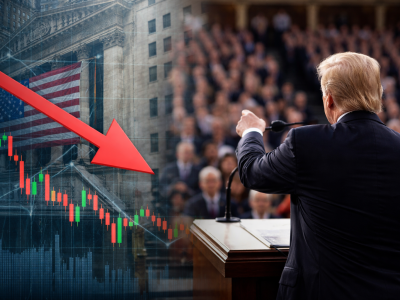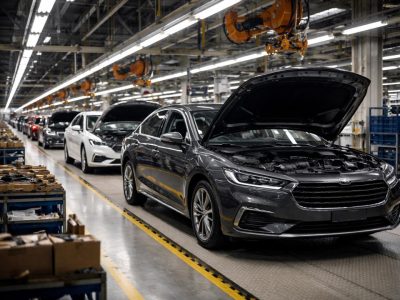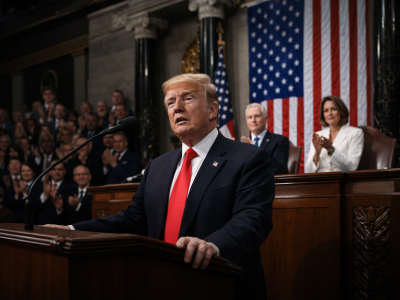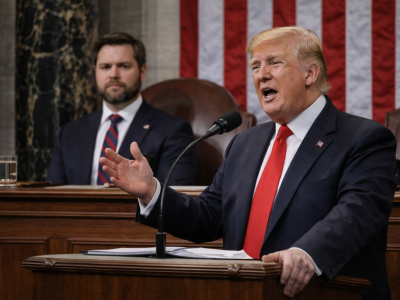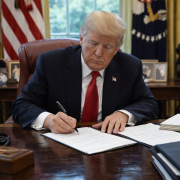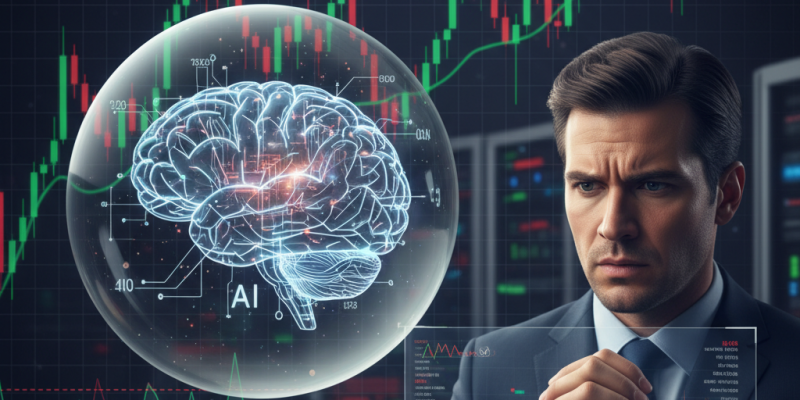
Last week, a sell-off in US artificial intelligence-related stocks due to fears of valuations getting out of hand also resurfaced an oft-discussed phenomenon in recent times: is there an AI bubble being formed?
While Monday brought cheer with major US indexes rallying on hopes that US government shutdown could be nearing an end, the concerns around AI-led valuations and dread of there being a bubble have merely been brushed aside for now, before the next trigger.
Invezz turned to Richard Peterson, American behavioural economist, called by the Associated Press ‘Wall Street’s top psychiatrist’, and founder of MarketPsych, to make sense of the roaring debate.
“Often when there is a bubble, people know that there’s a bubble, so they do talk about it,” Peterson tells Invezz.
However, contrary to a horde of experts comparing the so-called AI bubble to the dotcom one, Peterson seeks to point out a difference.
“I think back in the dotcom days, there were a lot of companies that had ideas but no revenue,” he says, referring to companies like Nvidia and Palantir which have “real revenue coming in”, adding that the current AI bubble is somewhat more ‘sober’ compared to the dotcom era.
“It’s definitely bubbly where we meet the criteria for a bubble, but I don’t think the whole AI industry is in a bubble,” he says.
Peterson also compares how chiefs of the top tech companies have adapted to the AI frenzy, how the media is playing a role in amplifying both enthusiasm as well as dread around AI and AI-related investment, and why it is time to look east at AI companies emerging from China and India.
Edited excerpts:
On the formation of an ‘AI bubble’ and what it reveals about the market and investors
Invezz: What does current market sentiment around AI — especially renewed fears of an “AI bubble” following recent earnings — reveal about investor behaviour and psychology based on your analysis of news and social media trends?
The sentiment obviously has been very high. For the last two or three months, people have been talking about a bubble.
And, when we look at just the number of counts of AI bubble in the media, you see it actually spiked around February of this year, and then it dipped during the tariff and trade war issues.
But then, about June or July of 2025, it again spiked. It became very high again and became higher than it was in February.
So, certainly, people have talked about it, and often when there is a bubble, people know that there’s a bubble, so they do talk about it.
So, the sentiment will often rise as the bubble forms early and then generally stays high throughout the period of the bubble, but it doesn’t go higher, like there are always sceptics while the market is rising, and the tricky thing with these bubbles, like this AI bubble, is that in certain sectors it appears to be deflating.
It’s already deflated quite a lot for many stocks. So one thing we see is that the sentiment will often dip before the bubble falls.
If you look at the chart (below) of moving averages of sentiment about the AI industry, the 30-day average is what has been very low recently.
Clearly, it started really dropping around October, the beginning of October this year.
Source: Richard Peterson
AI bubble more ‘sober’ than the dot com bubble; companies have real revenue coming in
Invezz: Experts are comparing the so-called AI bubble with the dot-com bubble. Based on your analysis of the investor sentiment prevailing now and what would have prevailed then, can you say with certainty that a bubble is indeed forming, and it can be compared with the dot-com bubble?
Yes, I think there are a lot of parallels in bubbles, right? Usually, it’s a new technology, and it inspires future expectations that are often not tethered to some fundamental profit motive.
So people just say, “Wow, this is going to be the best thing ever.” But they can’t tell you exactly how they’ll make money with it.
So there are future projections, and it goes from the expert realm into the kind of general imagination, which is what happened here.
So, it fits the criteria that are necessary to have a bubble.
One difference, though, is that companies like Nvidia, now a $5 trillion market cap company, have real revenue and companies like Palantir, one of the top performing stocks in history, also have real revenue coming in.
Now, it’s a lot less than the valuation would imply, but when you’re growing at 100% a year, it’s hard to know when that will stop.
So, I think back in the dotcom days, there were a lot of companies that had ideas but no revenue.
Here, you definitely have that happening, like, I’ve seen in the venture market- some venture capitalists are dumping money into these companies without any real evidence of a profitable roadmap, but for the most part, it’s been somewhat sober comparatively to the dot com era.
So yes, I mean, it’s definitely bubbly where we meet the criteria for a bubble, but I don’t think the whole AI industry is in a bubble.
I think some of it is in a bubble, and all of it will be affected by the shift in psychology.
And, a normal part of these cycles is the trough of disillusionment that comes after as part of the hype cycle, but what emerges out of that are the Amazons and the Googles and the big companies that really tend to dominate.
So I think yes, we will probably get some selloff, and I think what we’ll see is who isn’t building a profitable product and who is actually able to generate revenue, and a lot of the AI companies are generating revenue and are growing faster than any prior company in history in the technology space.
There are really pretty amazing things happening. Now, one of the concerns is whether that revenue is circular with these deals with Nvidia and OpenAI and others.
That’s a house of cards that could definitely fall, and I think that’s worrying the market. Also, there’s the low-cost competition from China.
There’s real money to be made here, but at the same time, you have real efficiencies coming out of China that are reducing the amount of profits that American companies can capture in the space.
So I think, after this period of selloff, we may see that the companies that actually can capture the value are not the ones competing with Chinese companies but the ones that are doing something local specific, that is, very helpful and generates a lot of value for end users on the ground.
On selloff witnessed by Nvidia and Palantir, and Michael Burry’s position
Invezz: You mentioned Nvidia and Palantir, and both these stocks witnessed a selloff last week, especially after Michael Burry revealed put options against both companies. Despite being solid companies, they witnessed a sharp reaction. How does one maintain sanity amid contradicting narratives?
I think the Michael Burry announcement has been really picked up by the media because the media is ready to be negative about this, and people are ready to read it.
People are reading it because they already have a fragile psyche. I mean, he’s definitely made some bad calls in the last few years as well.
So, what we tend to see at the top of a bubble is that there’s a moment when the market will sell off dramatically and then bounce back.
And in that moment, people realise how exposed they are. It happened when Trump reignited the trade war with China, and then China cut off the rare earths.
And so, I think what you’re seeing is the speculative nature. Obviously, there are good fundamentals, but a lot of speculators get into this too, especially when stocks have been going up for a long time.
And so, as they start to unravel and unwind their positions, you get negative pressure on the market overall.
And little by little, it creates a cascade. It hits margin call after margin call, and more and more people who are speculative get knocked out.
So, it doesn’t really have anything to do with the fundamentals of those companies. Those companies can be very strong.
It’s just who has accumulated a lot of shares and how vulnerable they are, and is there patient money waiting behind them like institutional money to buy those shares.
Some of the smaller AI names that are more speculative, like in the autonomous driving space, and some of the Chinese AI companies are really getting hit hard, like down 50%.
But it depends on where the speculation was. And some of those that got hit the hardest are the ones that had these two times ETFs launched.
So those ETFs, if you bought them at the top, you’ve lost almost all your money in the last month. And so that’s going to cause people to unwind as well.
How to spot genuine investment advice in media amid the AI craze
Invezz: You made an interesting point about the media. What has been your study of how the media has sort of amplified the enthusiasm/dread when it comes to AI investment, and how has that influenced the whole game?
So, when we study social media and news media separately, we see that social media tends to be more predictive in the medium to longer term than news media.
News media generally report on what has already happened. And if you’re a reporter and you make a bad report, if you say like, “Oh, look, AI stocks are going up,” and you cite experts who say they’ll continue to go up, when they reverse, you don’t look bad because you cited somebody else, and you can keep your job as a reporter.
But if you’re on social media and you make a lot of bad calls, people will stop.
They’ll block you, and they’ll stop talking to you, and you’ll embarrass yourself, and you probably invested money based on your ideas.
Therefore, you’ll lose your money, and you’ll give up. So, there’s a natural survivorship bias in social media where survivors tend to be better investors.
And so, you get somewhat better advice from social media, actually than from news media, except in bubbles like this, and the way you can disambiguate or disentangle bad advice on social media is that most people who are bad advisers talk only about the share price.
So people who are saying like, oh, the price is going up, it’s going to the moon, or you know, like let’s get the shorts- those people have no idea what they’re doing.
They’re going to get destroyed. So it’s mostly the people who are saying Oh look, the market size for this is growing by 30% a year and Oh the margins on this product are 80%- those people are the ones you want to follow and pay attention to.
They usually have been around a long time and have some wisdom to share.
Non-tech companies without an AI strategy are getting punished by markets
Invezz: How has this intense focus on AI in investment impacted investment in traditional sectors like finance or real estate? Is there a sense of “AI envy” driving market behaviour?
It’s a good question, and I’m speculating a bit here, but I think from what I’ve read, and you may have seen the same, that companies that talk about using AI in their earnings calls in industries besides AI generally do perform better than those that don’t talk about it.
We do have some evidence of that. Up till about a year ago we saw that but I’m not sure now how things are panning out but I have seen companies in non-AI or non-technology sectors, who did not have an AI strategy get punished, so certainly I think there is this bifurcation in the share prices if the CEOs and the management team are not talking about how they’re going to use AI.
And, I think that’s probably pretty rational because AI is speeding up and accelerating productivity quite a lot.
So, it depends, and like I said with the sell-offs now, it might be a good time to buy some of these stocks, honestly, because especially the ones where you have these leveraged two times ETFs and such, where people are being forced to sell.
On Meta and Zuckerberg’s AI enthusiasm, and who will survive the AI race
Invezz: Apple is seen as a laggard in AI when compared to its tech peers, while some others in the league have been more enthusiastic about integrating AI in their offerings. How do you compare the psyches of the management of the respective companies in terms of how they have adapted to the technology?
When you look at Meta and Mark Zuckerberg sort of investing enormous amounts of money in this (AI), that’s, I think, a sign of a bubble as well.
His efforts to try to catch up to everyone else, throwing huge amounts of money at something that DeepSeek could do and could beat his models for $6 million – that’s definitely a challenge there.
But, on the management side, I think, a lot of the people who are going to win from this are the ones who planned early on like Jensen Huang, and Sam Altman and Elon Musk, who’ve been thinking about this and planning for this for years and years.
Google obviously similarly. And then there are others like Satya Nadella- Microsoft is a very revered older company, but they are doing a fantastic job of integrating AI into all of their different office suite products and making them even stickier.
Then, Sundar Pichai of course at Google has done a great job with just managing all of those bets- quantum and everything and and that’s where I think they could now start to monetize a lot of those even better you know – Google brain and the protein folding, and there’s Calico Labs- there’s so many interesting things that they’re doing.
So, I think the CEOs who do the best are the ones really planning out 10 years ahead and not just one or two years ahead.
Time is ripe for Indian and Chinese AI companies to emerge
Invezz: How do you see the markets performing based on the themes that have played out and any new themes that you see emerging based on how the investors have taken their calls so far this year?
I feel like this is the time for smaller Indian and Chinese AI companies to emerge.
Especially in the next couple of years, you’ll see those winners coming out.
China has always been a dilemma because it always seems like they’re about to take off, and then they have problems again, often due to overcompetition or very low margins.
So, I don’t want to say that again, that okay now it’s China’s decade because it keeps not happening, but certainly there’s a lot of talent in India, and there’s a lot of interesting companies that are emerging there as well.
So, I think in the local market there’s probably some exciting opportunities, but let’s see what happens with the selloff- let it pan out, and probably something interesting will emerge from the ashes.
The post Interview: AI bubble is real, but more restrained than the dot-com era, says Richard Peterson of MarketPsych appeared first on Invezz

